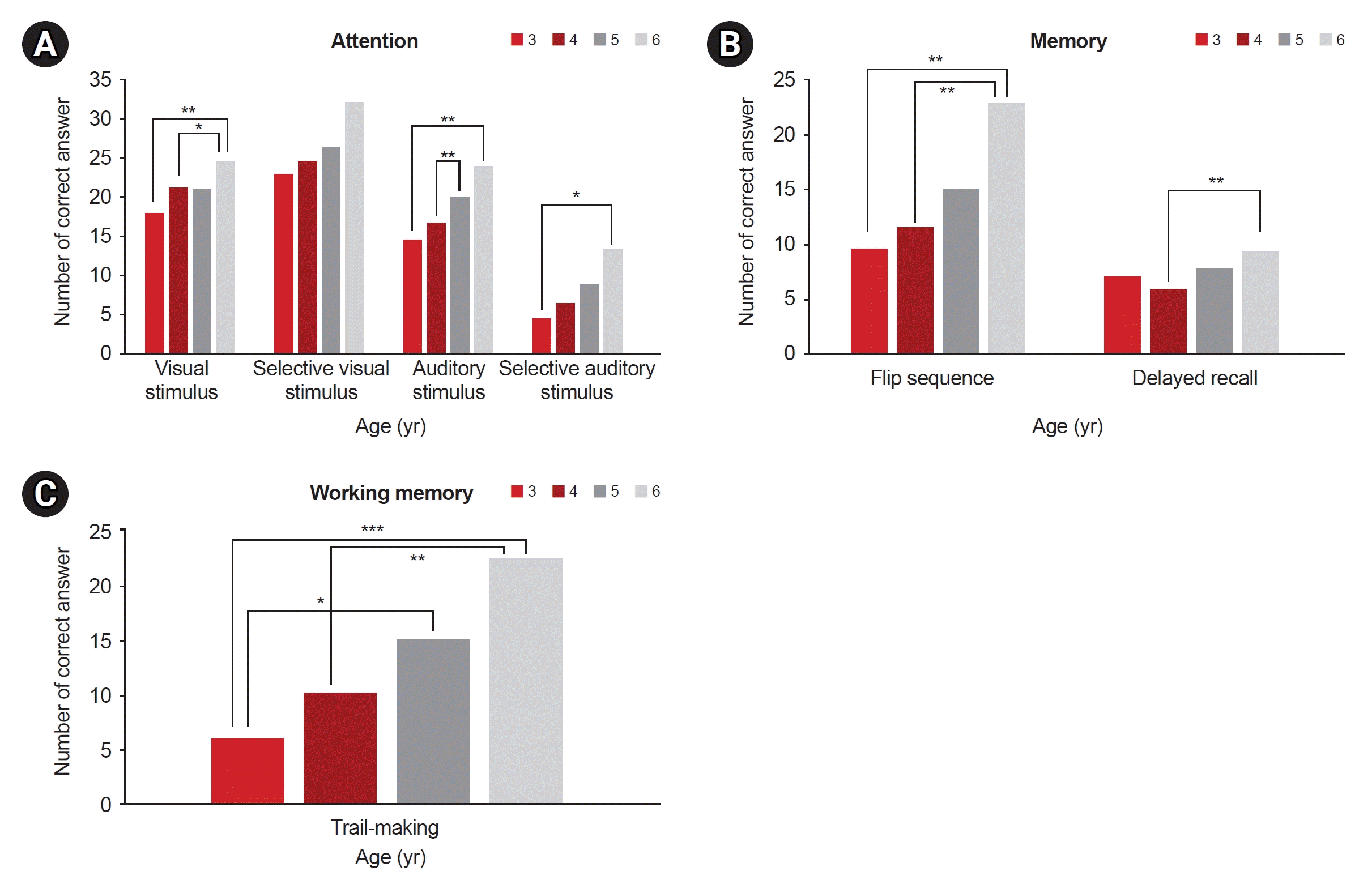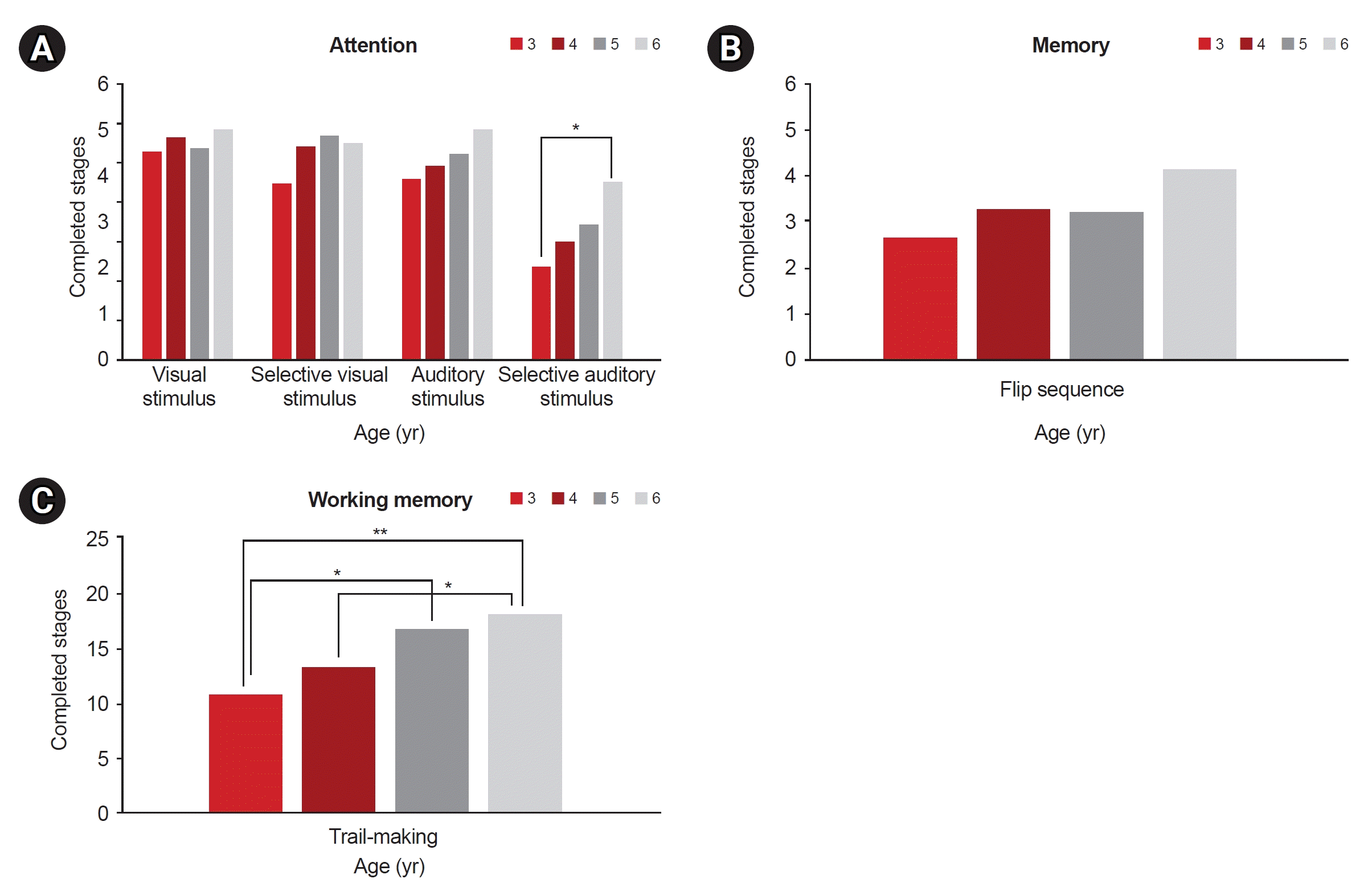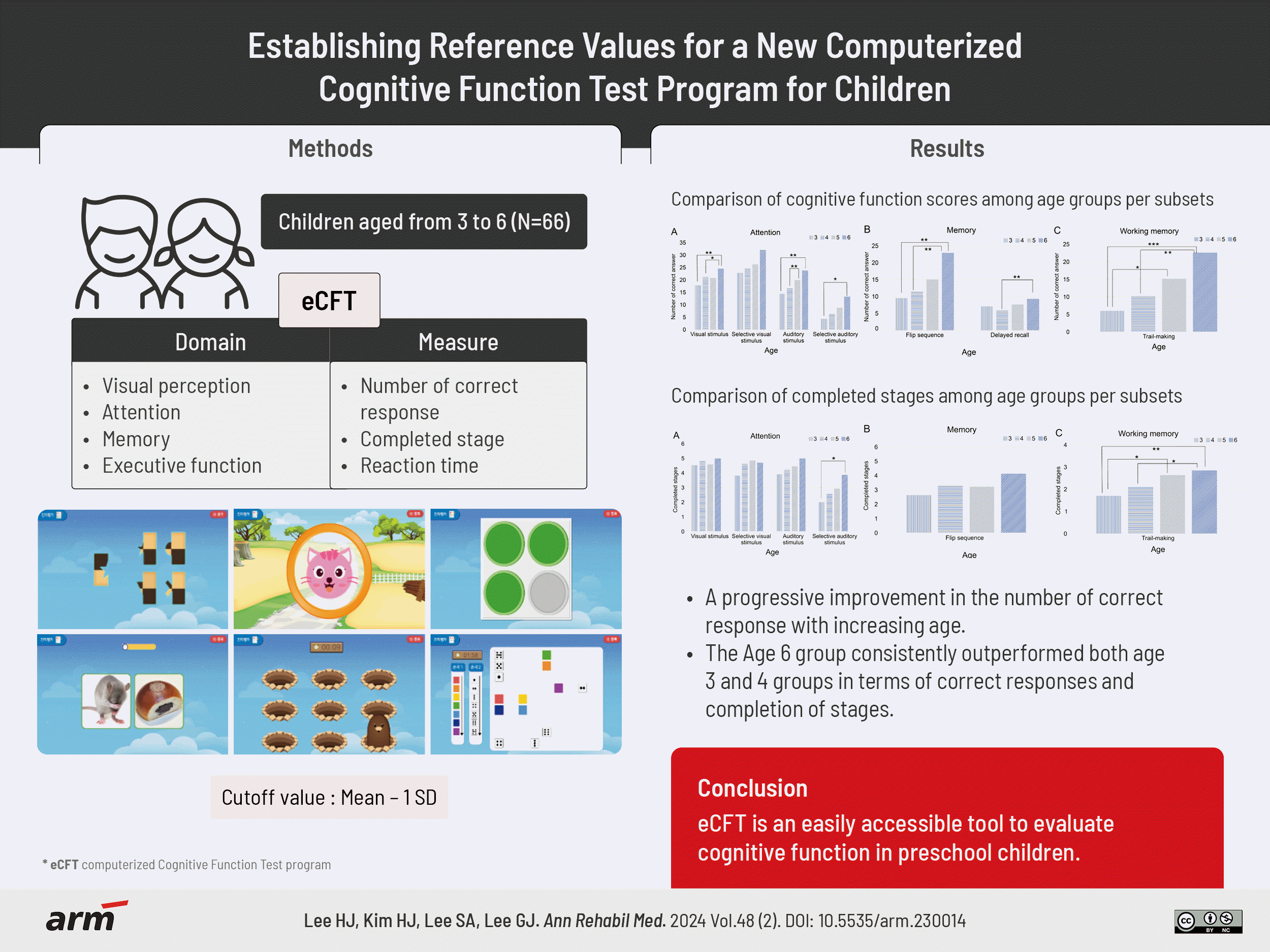1. Voorman JM, Dallmeijer AJ, Schuengel C, Knol DL, Lankhorst GJ, Becher JG. Activities and participation of 9- to 13-year-old children with cerebral palsy. Clin Rehabil. 2006; 20:937–48.

2. Laatsch L, Harrington D, Hotz G, Marcantuono J, Mozzoni MP, Walsh V, et al. An evidence-based review of cognitive and behavioral rehabilitation treatment studies in children with acquired brain injury. J Head Trauma Rehabil. 2007; 22:248–56.

3. Chevignard M. Children with brain tumours need long-term multidisciplinary psychosocial, neurocognitive, academic and rehabilitation follow-up programmes. Acta Paediatr. 2016; 105:574–5.

4. Bergquist T, Gehl C, Mandrekar J, Lepore S, Hanna S, Osten A, et al. The effect of internet-based cognitive rehabilitation in persons with memory impairments after severe traumatic brain injury. Brain Inj. 2009; 23:790–9.

5. Klingberg T, Fernell E, Olesen PJ, Johnson M, Gustafsson P, Dahlström K, et al. Computerized training of working memory in children with ADHD--a randomized, controlled trial. J Am Acad Child Adolesc Psychiatry. 2005; 44:177–86.

6. Takeda A, Loveman E, Clegg A, Kirby J, Picot J, Payne E, et al. A systematic review of the clinical effectiveness of donepezil, rivastigmine and galantamine on cognition, quality of life and adverse events in Alzheimer’s disease. Int J Geriatr Psychiatry. 2006; 21:17–28.

7. Woods B, Aguirre E, Spector AE, Orrell M. Cognitive stimulation to improve cognitive functioning in people with dementia. Cochrane Database Syst Rev. 2012; (2):CD005562.

8. Qiu H, Liang X, Wang P, Zhang H, Shum DHK. Efficacy of non-pharmacological interventions on executive functions in children and adolescents with ADHD: a systematic review and meta-analysis. Asian J Psychiatr. 2023; 87:103692.

9. Sibley MH, Bruton AM, Zhao X, Johnstone JM, Mitchell J, Hatsu I, et al. Non-pharmacological interventions for attention-deficit hyperactivity disorder in children and adolescents. Lancet Child Adolesc Health. 2023; 7:415–28.

10. Pangilinan PH, Giacoletti-Argento A, Shellhaas R, Hurvitz EA, Hornyak JE. Neuropharmacology in pediatric brain injury: a review. PM R. 2010; 2:1127–40.

11. Kesler SR, Lacayo NJ, Jo B. A pilot study of an online cognitive rehabilitation program for executive function skills in children with cancer-related brain injury. Brain Inj. 2011; 25:101–12.

12. Mozaffari M, Hassani-Abharian P, Kholghi G, Vaseghi S, Zarrindast MR, Nasehi M. Treatment with RehaCom computerized rehabilitation program improves response control, but not attention in children with attention-deficit/hyperactivity disorder (ADHD). J Clin Neurosci. 2022; 98:149–53.

13. Amiri S, Hassani-Abharian P, Vaseghi S, Kazemi R, Nasehi M. Effect of RehaCom cognitive rehabilitation software on working memory and processing speed in chronic ischemic stroke patients. Assist Technol. 2023; 35:41–7.

14. Jung H, Jeong JG, Cheong YS, Nam TW, Kim JH, Park CH, et al. The effectiveness of computer-assisted cognitive rehabilitation and the degree of recovery in patients with traumatic brain injury and stroke. J Clin Med. 2021; 10:5728.

15. Kim S, Park E, Cha H, Jung JC, Jung TD, Chang Y. Effects of cognitive training in mild cognitive impairmentmeasured by resting state functional imaging. Behav Sci (Basel). 2020; 10:175.

16. Kim SH, Gwak DW, Jeong JG, Jung H, Min YS, Kim AR, et al. Effect of computerized cognitive rehabilitation in comparison between young and old age after traumatic brain injury. Medicine (Baltimore). 2022; 101:e29874.

17. Billard C, Thiébaut E, Gassama S, Touzin M, Thalabard JC, Mirassou A, et al. The Computerized Adaptable Test Battery (BMT-i) for rapid assessment of children’s academic skills and cognitive functions: a validation study. Front Pediatr. 2021; 9:656180.

18. Tuerk C, Saha T, Bouchard MF, Booij L. Computerized cognitive test batteries for children and adolescents-a scoping review of tools for lab- and web-based settings from 2000 to 2021. Arch Clin Neuropsychol. 2023; 38:1683–710.

19. Shin MS, Cho S, Chun SY, Hong KM. A study of the development and standardization of ADHD diagnostic system. J Korean Acad Child Adolesc Psychiatry. 2000; 11:91–9.
20. Ha KS, Kwon JS, Lyoo IK, Kong SW, Lee DW, Youn T. Development and standardization process, and factor analysis of the computerized cognitive function test system for Korea adults. J Korean Neuropsychiatr Assoc. 2002; 41:551–62.
21. Chung HJ, Yang D, Kim GH, Kim SK, Kim SW, Kim YK, et al. Development of the Korean Developmental Screening Test for Infants and Children (K-DST). Clin Exp Pediatr. 2020; 63:438–46.

22. Kim D, Choe YJ, Durrani BAZ, Kim E, Byeon J, Eun BL. Korean Developmental Screening Test for Infants and Children (K-DST): development, applications, and implications for future early childhood development interventions. Clin Exp Pediatr. 2023; 66:288–93.

23. Eun BL. Standardization and validity reevaluation of the Korean Developmental Screening Test for Infants & Children. Korea Centers for Disease Control and Prevention;2017. p. 196–225.
24. Kaufman AS, O’Neal MR, Avant AH, Long SW. Introduction to the Kaufman Assessment Battery for Children (K-ABC) for pediatric neuroclinicians. J Child Neurol. 1987; 2:3–16.

25. Moon S. Korean Kaufman brief intelligence test. Inpsyt;2020. p. 155.
26. Ha KS, Kwon JS, Lyoo IK. Development and standardization of the computerized attention assessment for Korean adults. J Korean Neuropsychiatr Assoc. 2002; 41:335–46.
27. Hilbert S, Nakagawa TT, Puci P, Zech A, Bühner M. The digit span backwards task: verbal and visual cognitive strategies in working memory assessment. Eur J Psychol Assess. 2015; 31:174–80.
28. Mittelmeier C, Rossi JS, Berman A. Discriminative ability of the Trail Making Test in young children. Int J Clin Neuropsychol. 1989; 11:163–6.
29. Reitan RM, Wolfson D. The Trail Making Test as an initial screening procedure for neuropsychological impairment in older children. Arch Clin Neuropsychol. 2004; 19:281–8.

30. Hartle L, Martorelli M, Balboni G, Souza R, Charchat-Fichman H. Diagnostic accuracy of CompCog: reaction time as a screening measure for mild cognitive impairment. Arq Neuropsiquiatr. 2022; 80:570–9.

31. Martorelli M, Hartle L, Coutinho G, Mograbi DC, Chaves D, Silberman C, et al. Diagnostic accuracy of early cognitive indicators in mild cognitive impairment. Dement Neuropsychol. 2020; 14:358–65.

32. Johnson KA, Robertson IH, Kelly SP, Silk TJ, Barry E, Dáibhis A, et al. Dissociation in performance of children with ADHD and high-functioning autism on a task of sustained attention. Neuropsychologia. 2007; 45:2234–45.

33. Fuermaier ABM, Tucha L, Guo N, Mette C, Müller BW, Scherbaum N, et al. It takes time: vigilance and sustained attention assessment in adults with ADHD. Int J Environ Res Public Health. 2022; 19:5216.







 PDF
PDF Citation
Citation Print
Print





















 XML Download
XML Download